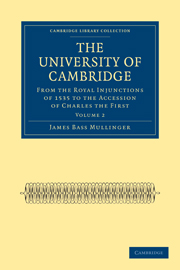Book contents
- Frontmatter
- PREFACE
- Contents
- ABBREVIATIONS, ETC.
- INTRODUCTION
- CHAP. I COMMENCEMENT OF THE UNIVERSITY ERA
- CHAP. II RISE OF THE ENGLISH UNIVERSITIES
- CHAP. III CAMBRIDGE PRIOR TO THE CLASSICAL ERA
- CHAP. IV STUDENT LIFE IN THE MIDDLE AGES
- CHAP. V CAMBRIDGE AT THE REVIVAL OF CLASSICAL LEARNING
- CHAP. VI CAMBRIDGE AT THE REFORMATION
- APPENDIX
- INDEX
- Frontmatter
- PREFACE
- Contents
- ABBREVIATIONS, ETC.
- INTRODUCTION
- CHAP. I COMMENCEMENT OF THE UNIVERSITY ERA
- CHAP. II RISE OF THE ENGLISH UNIVERSITIES
- CHAP. III CAMBRIDGE PRIOR TO THE CLASSICAL ERA
- CHAP. IV STUDENT LIFE IN THE MIDDLE AGES
- CHAP. V CAMBRIDGE AT THE REVIVAL OF CLASSICAL LEARNING
- CHAP. VI CAMBRIDGE AT THE REFORMATION
- APPENDIX
- INDEX
Summary
INTRODUCTION
The thirteenth century embraces within its limits an eminently eventful era in European history. It was an age of turbulence and confusion, of revolution and contention, wherein, amid the strife of elements, it is often difficult to discern the tendencies for good that were undoubtedly at work, and where the observer is apt to lose sight of the real onward progress of the current as he marks the agitations which trouble the surface of the waters. But that a great advance was then achieved it is impossible to deny. The social, the religious, and the intellectual life of Europe were roused by a common impulse from comparative stagnation. The Church, threatened by its own degeneracy, took to itself other and more potent weapons; scholasticism, enriched by the influx of new learning, entered on its most brilliant phase; oriental influences, the reflex action of the Crusades, stirred men to fresh paths of thought; and England, no longer regarded as a subjugated nation, grew rapidly in strength and freedom. To this century the University of Cambridge traces back its first recorded recognition as a legally constituted body, and refers the foundation of its most ancient college, and, in the absence of authentic records concerning her early history, it becomes especially desirable to arrive at a clear conception of the circumstances that belong to so important a commencement.
- Type
- Chapter
- Information
- The University of Cambridge , pp. 1 - 64Publisher: Cambridge University PressPrint publication year: 2009First published in: 1884



